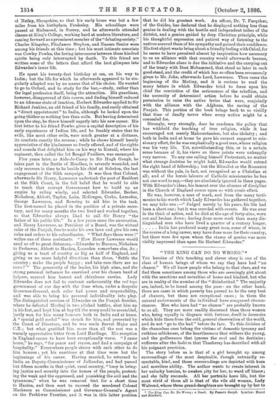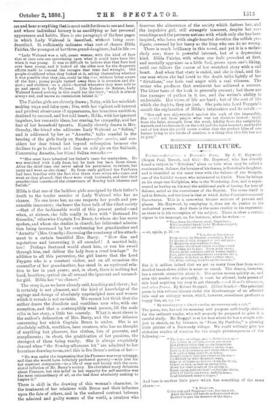"THE KING CAN DO NO WRONG."'
THE heroine of this touching and clever story is one of the class of human beings of whom we say they have had "no chance." We all know people who belong to that class, and we find them sometimes among those who are seemingly girt about with the sanctions and securities of home and kindred, but who are in reality of the number of the "disinherited." The majority are, indeed, to be found among the poor : on the other hand, there are cases in which poverty has proved to be the very best of chances, but these are exceptional cases ; in them the natural endowments of the individual have conquered circum- stances. Men who have had " no chance " are probably known to us all. They are more readily discerned than those women who, being equally in disgrace with fortune, dwell in decencies which hide them from the cold, general observation of the world, and do not " go to the bad " before its face. To this division of the chaneeless ones belong the victims of domestic tyranny and ruthless selfishness, of the heartlessness that withers the young, and the godlessness that ignores the soul and its destinies ; sufferers after the fashim. that Thackeray has described with all his poignant precision.
The story before us is that of a girl brought up among surroundings of the most despicable, though outwardly re- spectable, kind, and those surroundings are depicted with keen and merciless ability. The author welds to create interest in her unlucky heroine, to awaken pity for her, to ward off blame ; and she fully succeeds. All her portraits have life, but the most vivid of them all is that of the vile old woman, Lady Walrond, whose three grand-daughters are brought up by her to
• The King Can Do No Wrong : a Novel. By Pamela Sneyd. London : Hurst and Blacken.
see and hear everything that is most unfit for them to see and bear, and whose individual history is as unedifying as her personal appearance and habits. Here is one paragraph of the boar pages in which Lady Walrond is described, without being over- described. It sufficiently indicates what sort of chance Hilda Fairfax, the youngest of herthree grand-daughters, had in life :—
" Lady Walrond was a tall, gaunt woman, with the kind of face that at. once sets one speculating upon what it could have been like when it was young. It was so difficult to believe that that face had ever been young, and it looked all the older now for the desperate efforts made to conceal the ravages that time had wrought. Old people shuddered when they looked at it, asking themselves whether it was possible that they, too, could be like that, without being aware of the fact ; young people turned away from it in aversion and dis- gust ; and children—to a child—howled whenever they were told to go and speak to Lady Walrond. Like Madame de Sabran, Lady Walrond feared nothing in this world but the truth, ' which is almost always sad, and leaves no consolation behind it.' " The Fairfax girls are cleverly dra.wn; Netty, with her mischief- making ways and false eyes; Dee, with her vigilant self-interest and prudent observance of appearances, her tenacious ambition, destined to succeed, and her cold heart ; Hilda, with her ignorant impulses, her romantic ideas, her craving for sympathy, and her fear of her household tyrants. Equally cleverly drawn is Mrs. Ormsby, the friend who addresses Lady Walrond as " Selina," and is addressed by her as "Annette," talks scandal in the hearing of the girls freely on Sunday—after service, and con- siders her dear friend lost beyond redemption because she declines to go to church and dine on cold pie on the Sabbath. Concerning Annette, her friend Selina remarks :— " 'She must have inherited her father's taste for martyrdom. He was wretched with Lady Jane, but he took her back three times. After the third time she never asked his permission to return, but came and went as she chose.' So from early girlhood the Fairfaxea had been familiar with the fact that there were wives who came and went as they pleased, that there were weak husbands, and that their grandmother considered the observance of Sunday both irksome and foolish."
Hilda is that one of the luckless girls consigned by their father's death to the tender mercies of Lady Walrond who has no chance. No one loves her, no one respects her youth and pre- sumable innocence ; she hears the loose talk of the vilest society —that of the fashionable world of this present period—and when, at sixteen, she falls madly in love with " Bertrand Du Guesclin," otherwise Captain No Bruce, to whom she has never spoken, and whom she studies in church, her infatuated admira- tion being increased by her overhearing her grandmother and "Annette" (Airs. Ormsby) discussiug the constancy of his attach- ment to a certain beautiful Mrs. Barry. " How dim and mysterious and interesting it all sounded ! A married lady, too ! Perhaps Bertrand would shoot him, or run his sword through him, and deliver the lady from a cruel bondage." In addition to all this perversion, the girl knows that the Lord Feygate who is a constant visitor, and on all occasions the counsellor of her grandmother, has stood in an equivocal rela- tion to her in past years; and, in short, there is nothing but hard, heartless, cynical sin all around the ignorant and uncared- for girl. Hilda has "no chance."
The story is, as we have already said, touching and clever ; but it certainly is not pleasant, and the kind of knowledge of the sayings and doings of absolutely unprincipled men and women which it reveals is not enviable. We cannot but think that the author draws the dissolute and worthless men who, with one exception, and that a contemptibly weak person, fill the male
Ales in her story, a little too coarsely. What is most clever is the author's delineation of Mrs. Barry, and the utter delusion concerning her which Captain Brace is under. She is an absolutely selfish, worthless, base creature, who has no thought of anything but pleasure, fine clothes, lots of presents, and
compliments ; in short, the gratification of her passions, the strongest of them being vanity. She is always exquisitely dressed when " the Sunday-afternoon lot" are admitted to her luxurious drawing-room, and this is No Bruce's notion of her:-
" He was under the impreesicm that his Florence was very unhappy, and that she would have infinitely preferred poverty—with him for her constant companion—to a life of ease and luxury with the occa- sional infliction of Mr. Barry's society. He cherished many delusions about Florence, bat this belief in her capacity for self-sacrifice was the most extraordinary of all, as she had done absolutely nothing to inspire it."
There is skill in the drawing of this woman's character, in the treatment of her relations with Bruce and their influence upon the fate of others, and in the unforced contrast between the admired and guilty woman of the world, a creature who
deserves the abhorrence of the society which flatters her, and the impulsive girl, still strangely innocent, despite her sur- roundings and the perverse notions with which only she has been inspired, who loves with single-hearted devotion the selfish pro- fligate, crowned by her fancy as the king who can do no wrong. There is much brilliancy in this novel, and yet it is a melan- choly one; there is powerful interest, but of a depressing kind. Hilda Fairfax, with whom one feels provoked at first, and mentally appraises as a little fool, grows upon one's liking, until one follows the course of her wretched story with a sad heart. And when that story is ended, and she is dead, and the one man whom she had loved to the death talks lightly of her " flirtations," one feels real anger with a real vileness. The writer who produces that sentiment has achieved a success.
The bitter taste of the book is generally present; but there are fine passages of pathos in it too, and the writer's ability is undeniable. Her views of life are hard ; but of the sort of life which she depicts, they are just. She puts into Lord Feygate's mouth the explanation of Hilda's infatuation and its result :—
" Her end was shipwrecked against the rock of the impossible. She would ask from people what was not theirs to bestow : truth from the false, strength from the weak, fidelity from the unfaithful, warmth and tenderness fr.:An the cold and the hard-hearted ; and to the end of her days she could never realise that the perfect bliss of one human being at the hands of another, is a thing that this life has not to give."



































 Previous page
Previous page